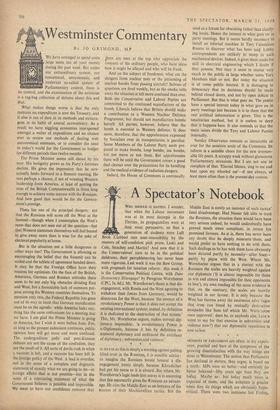IN SO FAR as this is simply a warning against
putting blind trust in the Russians, it is sensible advice : to imagine the Russians would honour a dis- engagement treaty simply because Khrushchev had put his name to it is absurd. But where Mr. Worsthorne's logic leads him astray is in assuming that this necessarily gives, the Russians an advant- age. He cites the Middle East as an instance of the success of their Machiavellian tactics. But the Middle East is surely an instance of such tactics' fatal disadvantage. Had Nasser felt able to trust the Russians, the situation there would have been very serious indeed; he would undoubtedly have proved much more compliant, in return for promised favours. As it is, there has never been any doubt that he deeply mistrusts them, and would prefer to have nothing to do with them. Such dealings as he has with them have obviously been dictated partly by necessity—after Suez— partly by pique with the West. Where Mr. Worsthorne argues that in a Contest with the Russians the scales are heavily weighted against our diplomats (It is almost impossible for them to win and almost impossible for their opponents to lose'), my own reading of the same evidence is that, on the contrary, the scales are heavily weighted in our favour. It is only because the West has thrown away the enormous advar tages that trust can breed by mutually destructive escapades like Suez (of which Mr. Worsthorne Once approved : does he, or anybody else, have a word to say for that exercise in subversion and violence now?) that our diplomatic reputation is now so low.


































 Previous page
Previous page